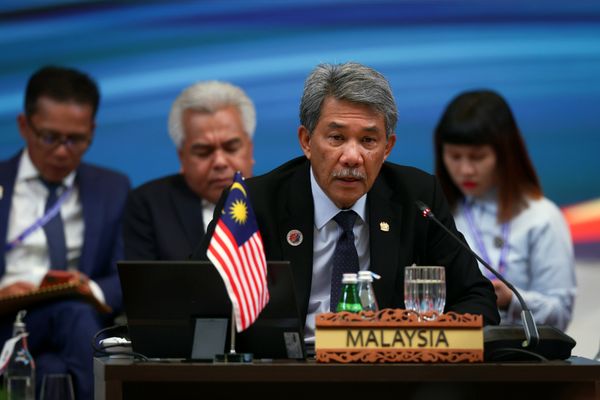By Danial Dzulkifly
KUALA LUMPUR, July 8 — Foreign Minister Datuk Seri Mohamad Hasan has warned that global nuclear disarmament efforts are regressing amid rising geopolitical tensions and the advent of emerging technologies.
Delivering his opening remarks at the Executive Committee Meeting of the Southeast Asia Nuclear-Weapon-Free Zone (SEANWFZ) Commission, he said the post-Cold War consensus on nuclear disarmament is under strain, with key treaties eroding and mistrust and arms modernisation rising among nuclear-armed nations.
“We are heading into a dangerous and uncharted territory. The Cold War may be over, but nuclear weapons are arguably more dangerous now than ever before,” Mohamad said, citing the United Nations High Representative for Disarmament Affairs’ report during the start of the meet at the Kuala Lumpur Convention Centre today.
He also drew attention to the conflict in Ukraine and the Middle East, including Israel’s unprovoked attack on Iran and its nuclear facilities, calling them clear violations of international norms and threats to the global disarmament agenda.
“The IAEA (International Atomic Energy Agency) has made two things clear: there is no evidence that Iran has a nuclear weapons programme, and nuclear facilities must never be attacked under any circumstances,” Mohamad said.
In an age where artificial intelligence, cyber warfare, and quantum computing intersect with nuclear policy, the risk of miscalculation is “unprecedented”.
Marking the 30th anniversary of the SEANWFZ Treaty, the minister also reaffirmed Asean’s commitment to a nuclear-free region.
While Southeast Asia remains free of nuclear weapons and other weapons of mass destruction, he expressed concern that the SEANWFZ Treaty’s Protocol has yet to be ratified by any of the five nuclear weapon states (NWS) — China, France, Russia, the United Kingdom, and the United States.
Mohamad urged Asean member states to remain united and proactive in resolving outstanding issues to pave the way for the treaty’s full recognition.
“The SEANWFZ Treaty must be a living, dynamic commitment, not just a symbol,” he said.
Previously, Mohamad revealed that China and Russia have agreed to sign the SEANWFZ Treaty, while the United States is reviewing the deal.
He said the superpowers’ involvement in the treaty will help preserve Southeast Asia as a region of peace that is free of nuclear weapons.
SEANWFZ, also known as the Bangkok Treaty, was signed in December 1995 in Bangkok by the 10 Asean members. It came into effect in March 1997.
The treaty’s protocol commits NWS to respect the SEANWFZ and not violate the treaty and its protocols, not to use or threaten to use nuclear weapons against states in the zone, and not to use or threaten to use nuclear weapons within the zone.
The SEANWFZ Commission meeting took place under the auspices of the 58th Asean Foreign Ministers’ Meeting and Related Meetings, scheduled from July 8 to July 11.


